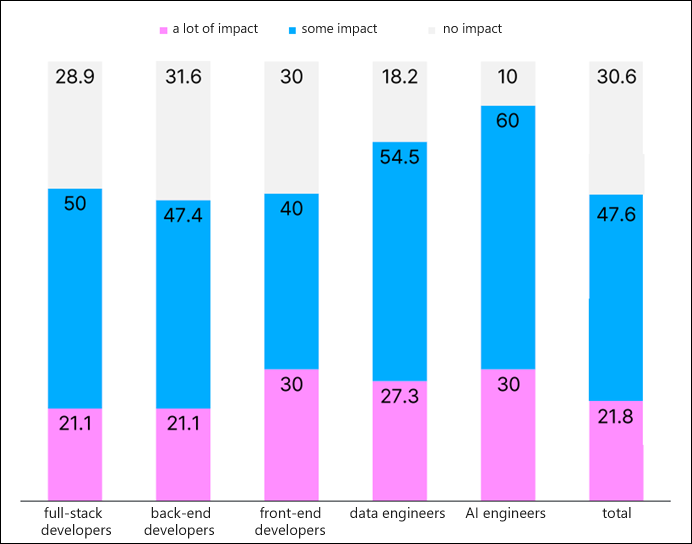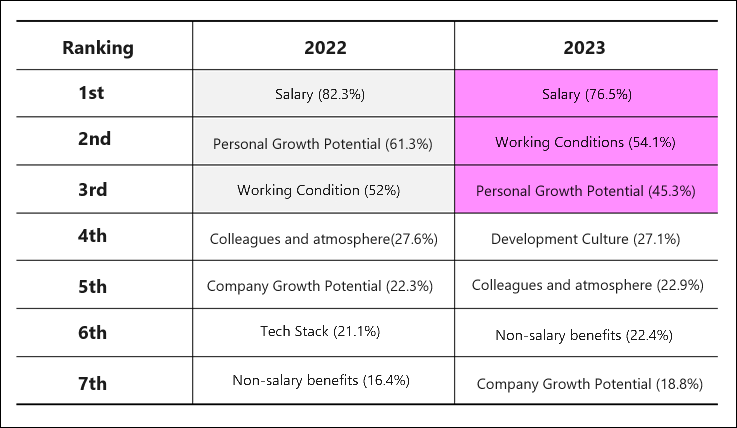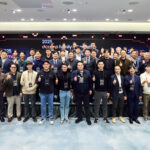
Will Generative AI replace developers? With all the talk about generative AI replacing development jobs, what do developers actually think?
According to a Wanted Lab survey, 83.6% of respondents said it would replace some of their jobs, and 8.2% said it could replace them completely. The remaining 8.2% don’t think it will be possible.
When asked to predict when they think generative AI will replace developers, 27.6% of respondents said more than five years to less than 10 years. This was followed by more than three years to less than five years (25.3%), more than one year to less than three years (21.2%) and less than one year (2.9%). A further 23% of respondents chose ‘other’, for example because they believe they will be able to replace it but can’t say when.
The survey also asked developers what level of experience they consider generative AI to be at today. Nearly half (42.9%) of respondents said they were at the 1-3 year level. This was followed by 3-5 years (30.6%), 5-7 years (10.6%), new (7.6%), more than 10 years (4.7%) and 7-10 years (2.4%).
Generative AI has been at the centre of technology change over the past year. The survey also found that developers are feeling the impact of the technology changes sparked by generative AI.
Firstly, 83.4% of respondents said they had experienced technology change in the past year. 40.2% reported a lot of change and 43.2% reported some change. By job function[1], perceptions of technology change varied, with 70% of AI engineers reporting a lot of change, particularly those working with generative AI.
But have these technology changes affected the work of actual developers? 69.4% of respondents said it had. When broken down by job role, AI engineers were most likely to feel the impact of technology change, with 90% saying it had affected their work. This was followed by data engineers (81.8%), full-stack developers (71.1%), front-end developers (70%) and back-end developers (68.5%).

Almost half (42.9%) of respondents felt that the job market was harder last year than it will be in 2022. 22.9% said it was about the same and 3.5% said it was easier. 30.7% said they hadn’t tried to change jobs in the past year and so couldn’t make a comparison.
The survey also looked at the criteria developers use to choose a company when changing jobs. When asked to choose more than one answer, salary (76.5%) was the most important factor. This was followed by working conditions (54.1%), personal growth potential (45.3%), development culture (27.1%), colleagues and team atmosphere (22.9%), benefits (22.4%) and company growth potential (18.8%).
Compared to the previous 2022 survey[2], there were some ranking changes in categories other than salary. Working conditions (3rd to 2nd) and non-salary benefits (7th to 6th) have risen, while personal development (2nd to 3rd), colleague and team atmosphere (4th to 5th) and company growth (5th to 7th) have fallen. Understandably, realistic and specific issues such as salary, working conditions and non-salary benefits have risen in importance as the main factors considered when changing jobs.

The report is based on a 6-day online survey of over 180 developers using Wanted, conducted between the 2nd and 7th of last month. The report covers developers’ experiences over the past year, including the impact of generative AI on their work, changes in technology and changes in the job market.







Leave a Comment